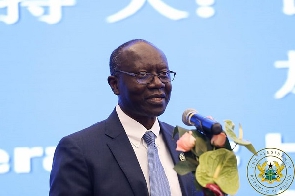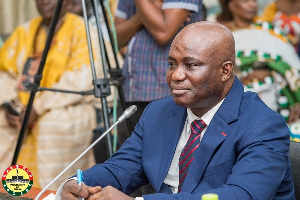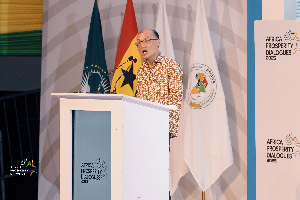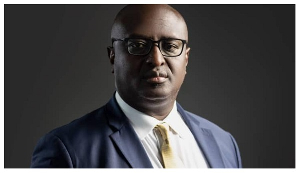We the undersigned, the Alliance for Social Equity and Public Accountability-ASEPA, the Coalition of Aggrieved Customers of Menzgold-COAM, the Coalition of Aggrieved Customers of GoldCoast Securities, the Coalition of Aggrieved Savings and Loans Cusomers-CASLOC officially petition the appointment committee of Parliament relative to the President’s nomination of Mr. Ken Ofori-Atta as Finance Minister-designate.
On the 22nd of January, 2021, the Presidency issued a communiqué informing the general public of the submission of a list of nominees to Parliament through the Speaker to be considered and vetted for the various ministerial portfolios.
Among the list of names submitted to the Speaker is Mr. Ken Ofori-Attah, the former Finance Minister and Finance Minister-designate herein referred to as the respondent of this petition.
It is our contention that the respondent occupied the position of Finance Minister of the Republic of Ghana, between 2017-2021, during such period the respondent acted in ways and manners that violated the Public Financial Management Act (PFMA), Fiscal Responsibility Act (2018), Public Procurement Act, Act 914, the Financial Administration Act, Act 654, the Code of Conduct for Public Officers and several other misconducts as explained in this petition.
Pursuant to existing protocols available to the Public to send memoranda to committees of Parliament during exercises such as the vetting of public officers, we wish to file this petition accordingly and to pray that the appointments committee rejects out rightly the nomination of Ken Ofori-Attah as Finance Minister designate on the grounds of Incompetence, over-exposure to the financial sector of the economy, record of abuse of office and gross misbehavior, and reckless violations of public financial laws and criminal misconducts among others.
1. Collapse of banks
The respondent as the Minister of Finance from 2017-2021 supervised the biggest banking crisis in the history of this Country. This led to the total collapse of over 7 indigenous banks, 23 savings and loans companies, over 300 microfinance companies and about 20 fund management companies.
We believe that the way and manner the so called banking sector clean up took place was reckless, unlawful and violated specific provisions of Act 930(the banking Act), Act 929(Securities Industries Act) and other relevant laws. The economic crisis that followed thereof from the loss of jobs, investments and an unprecedented liquidity challenge set Ghana up for a very painful yet avoidable period that still lingers on.
In this specific case of the banks, there are several instances where the conduct of the finance minister directly played a key role in their crisis and later collapse. Specific cases such as the collapse of Unibank, Heritage Bank and GN bank cannot be over-emphasized.
Kindly find attached and labeled as Exhibit A, a statement of clarification by the former Deputy Governor of the bank of Ghana, who admitted in the last paragraph of his statement of clarification that when Banks like Unibank were facing continuous liquidity challenges, the respondent, then Minister of Finance was summoned to a meeting at the Bank of Ghana to discuss the situation of Unibank and how the settlement of part of Government of Ghana’s obligations to Unibank could cure the crisis Unibank was going through at the time.
It would interest you to know that as at the time Unibank was going through its liquidity crisis, the Government of Ghana and quasi government Institutions owed the bank to the tune of GHC1.3Billion.
It is the part payment of this GHC1.3billion which the respondent was notified to facilitate to help resolve the challenges of Unibank which he failed to do that led to the criminal collapse of one of the biggest indigenous Ghanaian banks and led to the loss of over 4,000 direct jobs.
Kindly find attached a letter dated 22nd June, 2018 from KPMG the official Administrator of Unibank addressed to the respondent (Finance Minister) stressing the urgent need to pay part of this GHC1.3 billion owed to Unibank to help alleviate the liquidity challenges the bank was facing at the time, labeled as (Exhibit Y) as the former Deputy Governor’s Statement of Clarification indicated.
The case of GN bank is also fraught with the same failure of the respondent to effect payment of Government of Ghana’s exposures to the bank that ultimately led to its ruthless collapse and the subsequent loss of jobs and livelihood.
Which Finance Minister provides liquidity support to a bank at 26% interest rate whiles his Government and its agencies owes the same bank GHC1.3 Billion?
This is sheer criminality and we believe that the respondent based on his role in the collapse of Unibank, GN bank and Heritage bank is unfit to occupy such a sensitive position ever again because he acted in bad faith, relented on his fiduciary responsibility and failed to protect the larger interest of the public.
2. Agyapa Royalties scandal
The respondent as we speak is a subject of criminal investigations at CHRAJ, in the matter of Alliance for Social Equity and Public Accountability-ASEPA VS Ken Ofori-Attah and others. (A copy of CHRAJ’s response has been enclosed and labeled Exhibit B), where a criminal complaint was filed against the respondent based on a discovery by the Office of the Special Prosecutor (OSP) in a corruption risk assessment report.
The OSP report cited the respondent’s involvement in the violation of the Public Procurement Law and other relevant provisions in the selection of the respondent’s bank (Databank) as the transaction advisors and the respondents cousin’s law firm(African Legal and Associates) owned by Gabby Asare Otchere-Darko for the fraudulent Agyapa Transaction without any competitive tendering.
There were also allegations made by the Special Prosecutor that the respondent visited him severally while she was working on the risk assessment report(which the respondent was a subject of interest) attempting to interfere in the official investigations his office was carrying out. Is this not criminal?
Again, the Special Prosecutor through a public response alleged that the President (cousin of the respondent) attempted to influence the OSP to shelve the report that indicted the respondent.
Clearly this is a great testament that if this house approves the nomination of the respondent as Finance Minister, the President (his cousin) may always be tempted to violate the laws of the Country to protect the respondent even when he engages in criminal misconduct.
This we believe would only result in the worst form of criminality and abuse of office by the respondent and we therefore pray that this committee votes to reject the nomination of the respondent.
3. Over-exposure to the financial sector
The respondent is over exposed to the financial sector; he has demonstrated that his interests in the financial sector would always conflict with the larger interest of the nation and the economy.
For instance between the period of 2017-2021, we saw unprecedented borrowing, our National debt rose from GHC122billion as at the end of 2016 to about GH273.8billion as at the end of September, 2020 registering 71% of GDP, a significant amount of this raised through Eurobonds all of which the bank of the Finance Minister(Databank) was handpicked mostly through restricted tender as the transaction advisor.
Considering how much interest the bank of the respondent ( Databank) earned during those transactions, experts and a section of the public has raised serious concerns about our debt levels and the money the respondent was making in respect of the unprecedented growth in our public debt.
The respondent also has interests in the Insurance sub sector, with his firm Enterprise Insurance being handpicked as the official insurer of most State Assets, Facilities and Agencies without any competitive tendering at the detriment of the State Insurance Company, thereby making the respondent’s private insurance company overtake the State Insurance Company (SIC) something which has never happened in the history of the State insurer.
The Financial administration Act 2003, Act 654 clearly highlights situations/responsibilities that may result in a conflict of interest for the finance minister if he/she owns private businesses, they include;
i.The management and control of the Consolidated Fund and other public funds as captured in section 2 of Act 654, giving him the ability to manipulate his access to funds such that businesses that he has interest in may receive prompt payment for services rendered to the state.
ii.His ability to manipulate which banks certain special deposits accounts of the state are held as captured in section 19 and 48 of Act 654.
iii.His oversight of investment, loans and equity investments on behalf of the state as captured in section 21,23 and 24 of Act 654
iv.His responsibility to make regulations or issue instructions for the award of contracts of corporations as captured in Section 52 of Act 654.
Clearly the respondent between the periods of 2017-2021 when he was Finance Minister was caught severally in these situations enshrined in Act 654 and in all instances he violated these sections of the Financial administration Act, 2003 (Act 654) with impunity.
Kindly see the attached reference labeled as Exhibit X.
4. Payment of customers of the collapsed financial institutions
The respondent, during a presentation of the 2019 budget statement in Parliament claimed that he supervised the collapse of the financial institutions because he wanted to protect depositors.
Unfortunately that has been the exact opposite as the majority of the customers of the collapsed financial institutions are yet to receive any form of payment from the receiver.
Prior to the election last year, the respondent and his deputy made a very false claim that about 98% of all the customers of the financial institutions have been paid when in actual fact, only a paltry 18% have been fully settled.
It is important to note that the respondent as we speak does not have data on the customers of about 34 microfinance institutions, the list of such MFIs have been attached here and labeled Exhibit Z.
How then can this person, who has supervised the reckless collapse of financial institutions that led to the death of over thousands of people(according to a research report by ASEPA) be approved by this house to perpetuate such bizarre conditions on the people of Ghana again. We hope and pray that the committee would listen to the cries of the larger citizenry and reject his nomination accordingly.
5.Fiscal misreporting/manipulation
The respondent under his tenure as Finance Minister was caught severally misreporting data on the Ghanaian economy. In fact the respondent wasn’t just misreporting, he was also manipulating the figures such as making payments outside the GIFMIS system to hide the true extent of Government expenditures to create a false impression of good fiscal discipline.
This also had an effect on the deficit, which the Fiscal Responsibility Act had pegged its legal limit at 5% above which the Minister is to be held liable in accordance with law.
In May 2020, the IMF again exposed the respondent by adding two key items ie; the energy sector payments and the banking clean-up cost which the respondent had deliberately reported as below the line items to create a false deficit of about 4.5% of GDP when the true deficit was over 7.5% and posted our real deficit on its website.
This created an international spectacle as similar data had been reported to other international agencies, this further eroded public trust and confidence in Ghana’s financial data as reported by the government.
Considering the spectacle that the respondent created with serious misreporting and data manipulations, he does not exude public trust; he is not trustworthy and cannot be approved to stay in charge of the finances of this country.
Considering that the entire financial sector and the larger economy thrive on public trust and confidence, it would be suicidal to approve the nominee respondent who has no credibility and does not exude any trust. We believe that the effect of his approval on the economy would be unquantifiable and we pray this honorable committee to consider the national interest of the nation and reject the nomination of the respondent in accordance with law.
6.Flooding of state financial agencies with cronies
The respondent as Finance Minister recklessly removed several experienced public servants from the Ministry of Finance and replaced them with inexperienced cronies who had no experience in the public sector, thereby weakening the technical capabilities and expertise of the ministry.
The respondent filled almost all state financial institutions with his cronies, former partners and acquaintances from Databank his private company thereby giving him immeasurable advantage and control of the financial sector and the entire economy and using the same for his private interests as enshrined above.
For example; the Ghana Exchange Commission is headed by Mr. Alfred Ogbarmey, a former employee of the respondent at Databank, GIPC is occupied Yofi Grant also a former employee from Databank, the Ghana Insurance Commission is occupied by the brother of the head of Enterprise Group, the private company of the respondent and several other entities headed by close acquaintances of the respondent, a situation that is clearly unacceptable.
7.His role in the establishment of CBG
It is public knowledge that the Consolidated bank Ghana was set up by the Ministry of Finance. Our search from the Registrar General’s department disclosed that Consolidated Bank Ghana (CBG) was incorporated on the 1st of August, 2018 and a Certificate to Commence Business was issued to the CBG on 2nd August, 2018, we also found out that the selected assets and liabilities of the 5 banks namely; Royal Bank, Sovereign Bank, Unibank, Beige and Construction Bank were transferred to the CBG on the 1st of August, 2018 before the grant of a certificate to commence business on the 2nd August, 2018.
However section 27 of the Companies Act, 1963(Act 179) prohibits a company incorporated in Ghana from transacting any form of business until it has satisfied all processes and secured a certificate to commence business.
A violation of this provision constitutes a criminal offense for which the company and every officer of the company shall suffer penalty under section 29 of Act 179.
So clearly the respondent and his associates who formed CBG violated the explicit provisions of Act 179 and committed a crime under the Act and are liable to the consequences as enshrined in section 29 of Act 179.
How can such a person be approved to occupy the position of Finance Minister again when he abused the trust reposed in him and violated the laws of the land with impunity when he occupied the same position between 2017-2021.
Under this law, the nominee and all those who formed CBG should be standing criminal prosecution instead of being vetted to occupy the same position again.
Considering the nature of this petition and the fact that the vetting of the respondent is a public hearing, we hereby declare that the Committee can count on us for any further information on the respondent nominee, we are also ready to assist the committee in any regard to do due diligence on the nominee and to assist them discharge their duties efficiently.
It is our contention that the respondent nominee is ethically unfit, operationally incompetent and legally vexatious and cannot be approved to occupy the office of Finance Minister. We therefore pray that the committee as representatives of the people reject his nomination in furtherance of the wish of the people.
We pray that the committee would act accordingly.
Signed:
Mensah Thompson
Executive Director, ASEPA
0542120628
Ezekiel Akagbo
Coalition of Affected Saving and Loans Customers
0243874772
Charles Nyame
PRO
Coalition of Aggrieved Customers of Gold Coast Securities
0247222613
Fred Forson
Coalition of Aggrieved Customers of Menzgold
0502133763
cc.
The Speaker of Parliament
The Ranking Member of the Appointment Committee
All Members of the Appointment Committee
Press Releases of Friday, 7 May 2021
Source: Alliance for Social Equity and Public Accountability

















